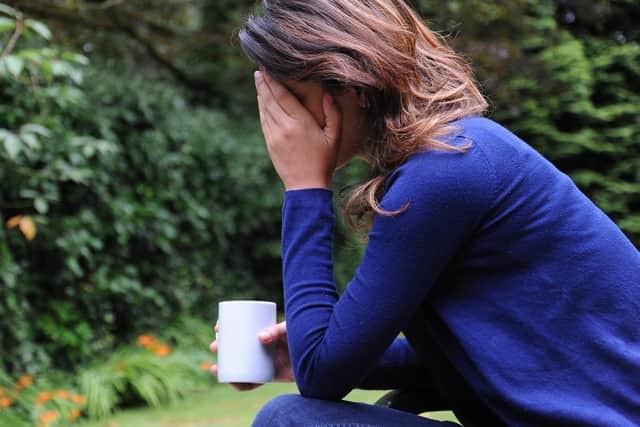Around one in nine adults in Crawley depressed
and live on Freeview channel 276
Charity Mind said England is facing a 'mental health pandemic' and called for a stronger Government approach to tackle the widening inequalities in care.
Analysis of NHS estimates by the House of Commons Library shows 11.6 per cent of adult GP patients across Crawley had a diagnosis of depression in 2019-20.
Advertisement
Hide AdAdvertisement
Hide AdThis was a similar rate to the 11.5 per cent average across England.


And out of Crawley's 13 areas, it was even higher in Tilgate where 13.4 per cent were depressed.
The lowest rate was in Broadfield East where ten per cent of patients were depressed.
Brinnington, in Stockport, had the highest rate nationally, with 27 per cent, while less than four per cent were depressed in parts of Westminster.
Advertisement
Hide AdAdvertisement
Hide AdMind said bereavement, isolation, and the economic recession mean the nation is now facing a 'mental health pandemic', and that a strategic approach from the Government is needed.
Vicki Nash, head of policy and campaigns at the charity, said: "This strategy must focus specifically on communities disproportionately affected by the pandemic, including racialised communities and young people.
"It must address widening inequalities, sort out our woefully underfunded social care system, fund public health, and make sure the education system supports young people’s wellbeing.
“It’s important that no matter where you live, you are able to get the support you need when you need it."
Advertisement
Hide AdAdvertisement
Hide AdNew figures from the Office for National Statistics show one in five adults experienced depressive symptoms between January and March – more than double the year before.
Recent research from Mind found that the lack of face-to-face support caused by the pandemic has been particularly hard for those with severe mental health problems such as psychosis and schizophrenia.
The House of Commons Library data shows that 0.8 per cent of patients across Crawley were diagnosed with schizophrenia, bipolar disorder and other psychoses last year.
These were highest in Ewhurst and West Green, where one per cent had a diagnosis, while in five areas it was 0.7 per cent.
Advertisement
Hide AdAdvertisement
Hide AdResearchers warned that variation across the country might reflect differences in the way GPs record health conditions, as well as genuine variation in prevalence.
The Mental Health Foundation said bullying, particularly within gang culture, is one of the key triggers for being diagnosed with schizophrenia – and is often higher in poorer areas.
Dr David Crepaz-Keay, head of applied learning at the organisation, said the gap between rich and poor is only likely to widen post-pandemic.
He added: "If we want to reduce those mental health inequalities then we have to start to prioritise actions against some of these social determinants.
Advertisement
Hide AdAdvertisement
Hide Ad"We also need to get better at providing support to people who are victims of these events as part of our mental health response.
"We can’t treat our way out of this, we have to rebuild our communities back properly."
The charity organises the annual Mental Health Awareness Week, which runs from May 10-16 this year.
The Government said it is providing an additional £2.3 billion a year by 2023-24 for mental health services.
Advertisement
Hide AdAdvertisement
Hide AdA government spokeswoman added: “Hundreds of billions have been spent to help those most in need throughout the pandemic, safeguarding jobs, boosting welfare support, raising the living wage and introducing the £269 million Covid Local Support Grant to help children and families stay well-fed.”